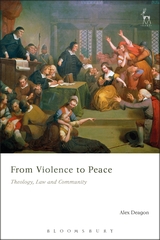From Violence to Peace: Theology, Law and Community

From Violence to Peace: Theology, Law and Community
Alex Deagon
Hart Publishing 2017
This book contributes to the literature on jurisprudence and theology by arguing for the role of a theoretically robust Christian theology in a legal community dominated by secular and liberal ideology. It is not a doctrinal or empirical analysis, but a theoretical exposition of the way in which modern law has contingently drifted from its theological origins. As a result, the legal system and the ideal of individual and communal relationship it envisages is characterised by antagonism and alienation, or more broadly, violence. The book contends that the way to restore a legal community of peace is to return to a Christian theology which is informed by Trinitarian thinking or the notion of unity in diversity, and reunites faith with reason. Returning reason to its ground in being allows peaceful persuasion by the revelation of God’s perfect being through the Trinity and Incarnation, which models and enables the peaceful coexistence of difference through self-sacrificing love. This in turn produces the law of love – to love your neighbour as yourself. Since love does no wrong to a neighbour, a legal community operating by the law of love can fulfil the obligations of law by going beyond merely what is required by law and love individuals as part of a community.
Table of Contents
Introduction
I. From Violence to Peace
II. The Nature of Violence
III. Envisaging the Peaceful Legal Community
IV. The Secular Challenge
V. The Argument of this Book: From Violence to Peace
1. Milbank’s Milieu: Theorisations of Truth, Faith and Reason
I. Introduction
II. Milbank’s Theoretical Context
III. Critiquing the Secular Genealogy
IV. The Truth of Theology: Producing Peace through Trinitarian Correspondence
V. Rejecting Secular Reason
VI. Promoting Faith and the Reason of Theology
2. Secularising Science: The Divorce of Reason and Revelation
I. Introduction
II. The Theological Genesis and Subsequent Secularisation of Science
III. (No) Salvation by Faith Alone: How the Reformation Further Divided Faith and Reason
IV. Uniting Faith and Reason to Restore True Scientia: The Participation Model
3. Deconstructing Derrida: Law, Spirit, Logos
I. The Postmodern and the Pagan
II. Different Perspectives: The Metanarratives of Jacques Derrida
III. The Pagan Differ(a)nce
IV. Moving Perspectives: From Secular Reason to Christian Theology
V. A Genuinely ‘Postmodern’ Theology
VI. The Threshold of Ontological Peace: Constructing a Christian Theology of Legal Community
4. An Account of Secular(ised) Jurisprudence: Violence from Duns Scotus to Derrida
I. Law and Postmodern Critical Augustinianism
II. Faith, Reason and a Theological Natural Law
III. ‘Creating’ the Secular: Duns Scotus, Univocity and Separating Philosophy from Theology
IV. Machiavelli and Hobbes: Secular Legal Ontology and the Emergence of Governing Violence
V. The Final Stage: Austin, Hart and the Violence of Secular Positivism
VI. Diagnosing Legal Violence: Cover, Benjamin and Derrida
VII. Escaping Legal Violence and the Possibility for Christian Peace
5. Violence, Attestation and Revelation: Reading Law and Truth in the Trial of Christ
I. The Trial as a Narrative of Law and Truth
II. Laws of Sin and Laws of Spirit: Paul, Faith and the Torah
III. Christ Crucified: Conviction by the Law of Death
IV. The Revelation of Christ: Faith, Mystery, Atonement
V. Light in the Darkness: The Law of Love, Faith and Participation
VI. Resurrecting the Peaceful Legal Community
6. The Paradox of Law and Truth in Christianity: On Materialism, the Sublime and Reading the Pauline Law of Love
I. Žižek, Materialism and the Christian Legacy
II. The Sublime Object: Defeating Death
III. The Sublime Truth of Faith: Paradoxical Law, Love and Life through Resurrection
IV. Manifesting the Peaceful Community: Faith and Practice
7. ‘Love Your (Legal) Neighbour as Yourself ‘: Producing Peace through a Theological Jurisprudence of Truth
I. ‘The End of Reason’: The Blind Faith of Secular Reason and Recovering Reason through the Incarnational Paradox
II. ‘Faith in the Truth of Christianity’: Correspondence through Revelation and Rhetoric
III. Revealing an Ontology of Peace: The Nature of Peace and Violence in Christianity
IV. Christian Theology and the Modern Legal Community: Proposing the Law of Love
V. The Law of Love, or Love beyond Law: Releasing the Spirit of the Good Samaritan
VI. Fulfilling the Christian Vision of a Peaceful Legal Community
Alex Deagon is Lecturer in the Faculty of Law at Queensland University of Technology, Brisbane.